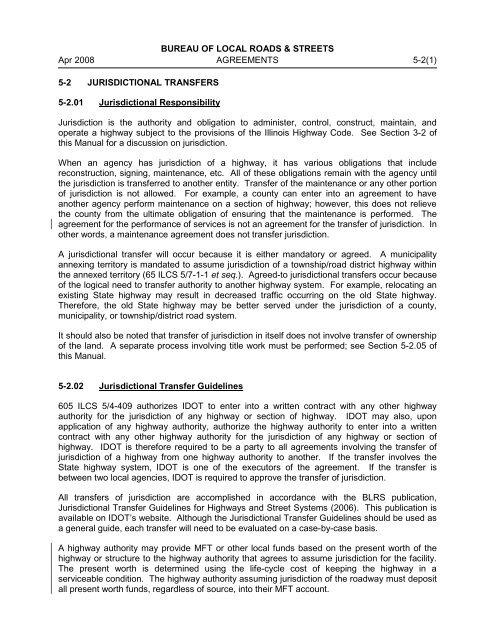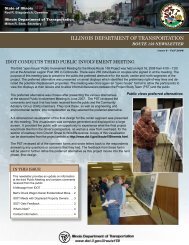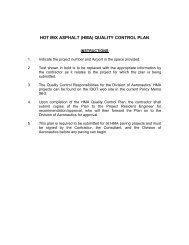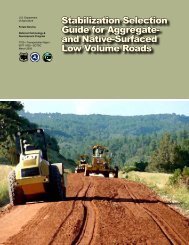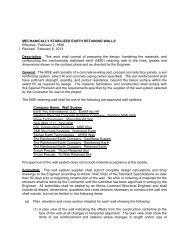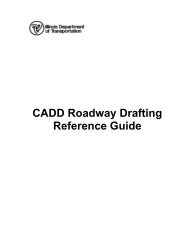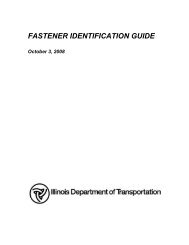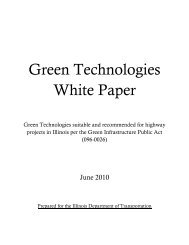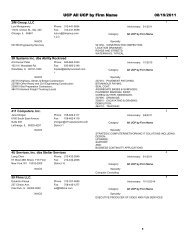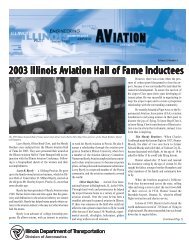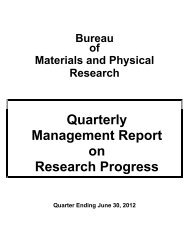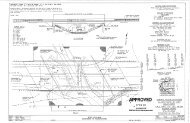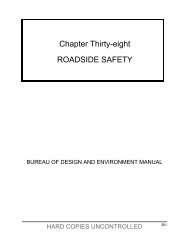Chapter Five AGREEMENTS - Illinois Department of Transportation
Chapter Five AGREEMENTS - Illinois Department of Transportation
Chapter Five AGREEMENTS - Illinois Department of Transportation
You also want an ePaper? Increase the reach of your titles
YUMPU automatically turns print PDFs into web optimized ePapers that Google loves.
BUREAU OF LOCAL ROADS & STREETS<br />
Apr 2008 <strong>AGREEMENTS</strong> 5-2(1)<br />
5-2 JURISDICTIONAL TRANSFERS<br />
5-2.01 Jurisdictional Responsibility<br />
Jurisdiction is the authority and obligation to administer, control, construct, maintain, and<br />
operate a highway subject to the provisions <strong>of</strong> the <strong>Illinois</strong> Highway Code. See Section 3-2 <strong>of</strong><br />
this Manual for a discussion on jurisdiction.<br />
When an agency has jurisdiction <strong>of</strong> a highway, it has various obligations that include<br />
reconstruction, signing, maintenance, etc. All <strong>of</strong> these obligations remain with the agency until<br />
the jurisdiction is transferred to another entity. Transfer <strong>of</strong> the maintenance or any other portion<br />
<strong>of</strong> jurisdiction is not allowed. For example, a county can enter into an agreement to have<br />
another agency perform maintenance on a section <strong>of</strong> highway; however, this does not relieve<br />
the county from the ultimate obligation <strong>of</strong> ensuring that the maintenance is performed. The<br />
agreement for the performance <strong>of</strong> services is not an agreement for the transfer <strong>of</strong> jurisdiction. In<br />
other words, a maintenance agreement does not transfer jurisdiction.<br />
A jurisdictional transfer will occur because it is either mandatory or agreed. A municipality<br />
annexing territory is mandated to assume jurisdiction <strong>of</strong> a township/road district highway within<br />
the annexed territory (65 ILCS 5/7-1-1 et seq.). Agreed-to jurisdictional transfers occur because<br />
<strong>of</strong> the logical need to transfer authority to another highway system. For example, relocating an<br />
existing State highway may result in decreased traffic occurring on the old State highway.<br />
Therefore, the old State highway may be better served under the jurisdiction <strong>of</strong> a county,<br />
municipality, or township/district road system.<br />
It should also be noted that transfer <strong>of</strong> jurisdiction in itself does not involve transfer <strong>of</strong> ownership<br />
<strong>of</strong> the land. A separate process involving title work must be performed; see Section 5-2.05 <strong>of</strong><br />
this Manual.<br />
5-2.02 Jurisdictional Transfer Guidelines<br />
605 ILCS 5/4-409 authorizes IDOT to enter into a written contract with any other highway<br />
authority for the jurisdiction <strong>of</strong> any highway or section <strong>of</strong> highway. IDOT may also, upon<br />
application <strong>of</strong> any highway authority, authorize the highway authority to enter into a written<br />
contract with any other highway authority for the jurisdiction <strong>of</strong> any highway or section <strong>of</strong><br />
highway. IDOT is therefore required to be a party to all agreements involving the transfer <strong>of</strong><br />
jurisdiction <strong>of</strong> a highway from one highway authority to another. If the transfer involves the<br />
State highway system, IDOT is one <strong>of</strong> the executors <strong>of</strong> the agreement. If the transfer is<br />
between two local agencies, IDOT is required to approve the transfer <strong>of</strong> jurisdiction.<br />
All transfers <strong>of</strong> jurisdiction are accomplished in accordance with the BLRS publication,<br />
Jurisdictional Transfer Guidelines for Highways and Street Systems (2006). This publication is<br />
available on IDOT’s website. Although the Jurisdictional Transfer Guidelines should be used as<br />
a general guide, each transfer will need to be evaluated on a case-by-case basis.<br />
A highway authority may provide MFT or other local funds based on the present worth <strong>of</strong> the<br />
highway or structure to the highway authority that agrees to assume jurisdiction for the facility.<br />
The present worth is determined using the life-cycle cost <strong>of</strong> keeping the highway in a<br />
serviceable condition. The highway authority assuming jurisdiction <strong>of</strong> the roadway must deposit<br />
all present worth funds, regardless <strong>of</strong> source, into their MFT account.


